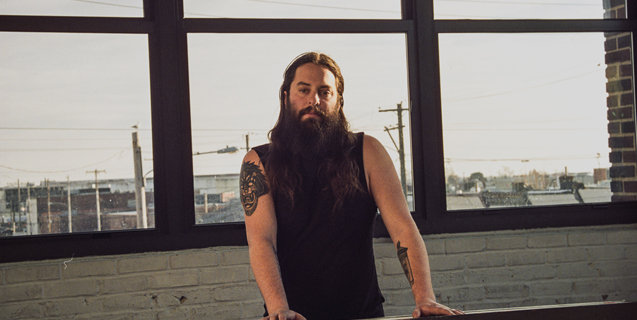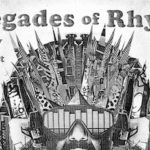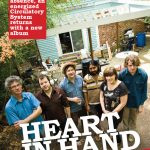It’s not easy sending pain into the world, but sometimes pain is all you have to give. It can be odd, then, when that pain finds a pulse with an audience – and they love you for it.
Timothy Showalter, the man behind the band Strand of Oaks, wanted to create a record about youth, relationships and uncertainty – he wanted to write an album he would have liked as a 15-year-old. The musical missive ran the emotional gamut – mental, physical, spiritual – with few expectations anyone would listen, or care.
But the result, called HEAL, proved lasting, cathartic and (to Showalter’s surprise) popular.
“I think back to September of 2013 when I started writing these crazy songs that I wasn’t sure if anyone was going to like and in a fake humble way I literally thought these are the weirdest songs ever, no one is going to want to listen to these,” he said. “And then they did and I don’t know what happened but it seemed to have struck some chord everywhere. Some records I’ve put out and the Germans would love them, and that was it. But this one was I don’t know. Maybe everyone was weird at 15 at one point.”
It’s a satisfying time for Showalter, and well-earned considering the series of calamities which befell him in the last decade. There was the marriage proposal to his high school sweetheart which was at first accepted only to be summarily declined. Not long after the break-up, a fire swept through his Pennsylvania house and destroyed all his possessions. Losing everything turned him to music, where he found solace through a musical airing of grievances. Yet his first three albums – Leave Ruin, Pope Killdragon and Dark Shores – found moderate success but didn’t move him too far up the touring bill.
But in 2013 something clicked, and he furiously started writing the songs which would become HEAL. An album of guitars, rock anthems and autobiographical confessions, it was nothing like he’d done before – and it almost never saw the light of day. Driving home with his wife (he married in 2010) on Christmas Day, his Honda Fit slid on black ice and fishtailed into oncoming traffic, where it was hit by not one, but two semi-trailers.
Somehow they both survived. A week later Showalter, with a row of broken ribs on his right side, mixed HEAL.
It found critical and commercial success. Finally, some needed pleasure from so much pain.
“Success for me does not mean money, success for me means it’s validating and it proves this thing I’ve loved all my life, that has been my escape and sometimes my only escape, I’m doing it well enough for people to like and come to shows,” Showalter said. “I never thought I would be able to do that. I don’t give a s-t about if I can buy this or that, I’ve got holes in my jeans right now and I made money this year, but it doesn’t matter. I’m going to be a mess either way, but it’s just cool to know that.”
Showalter wasn’t sure how well he’d endure playing songs from HEAL live, the process was so personal he feared a breakdown was coming. But he gathered up a band for a tour (the album has Showalter playing almost all the instruments) who brought a different vibe to the recorded songs. What started as fear became something else.
“I was freaking out when we were playing those first shows – I’m a dramatic guy in the first place, but I felt I was going to break down,” he said. “But the second we started playing them I was turning up the guitar and started fighting it with the guitar and singing. I said ‘Wait, this is the opposite, I feel really good and empowered right now.’ I think catharsis doesn’t mean you have to watch a sad movie and leap into a bathtub, it can also mean flexing your muscles and drunkenly hugging everybody in the audience.”
On stage Showalter can be a raving madman, aching to give the crowd a lasting memory, while finding different arcs on songs not found on the original recordings (“Some of the songs are almost unrecognizable at this point,” Showalter said, “but there’s still the essence of the song”). Word has gotten around, and Strand of Oaks not only has international dates in Australia, Greece, Spain and Britain, but also national slots at Bonnaroo, Sasquatch and Lollapalooza.
“It’s funny we’re playing both Athens this year – the original Athens and the other Athens, like within a month of one another,” Showalter said. “I know all the gods and stuff are from the original Athens but my musical gods are coming from your place.”
The touring has opened up the writing faucet for Showalter, who is using the live show as inspiration for new material. He’s found this time that the passion for new music isn’t coming from pain, but from the joyful energy of being on stage.
“I just had this discussion with a friend about how I’m writing the new songs and for the first time I’m writing songs with the feeling of the live show,” he said. “I know what I love to play live and how I want to translate it and it’s affecting the songwriting process. I want to translate all of this epic energy in my head that is so hard to release anywhere else in my life. I want to make a record that releases that and not necessarily in a ‘feel bad for me’ heartbroken way – you can be cathartic and feel awesome.
“I don’t think I’ll ever be able to take a break from heartbreak, but I don’t need my bio to read like a Raymond Carver novel anymore. I’d like it to read a little bit lighter.”




